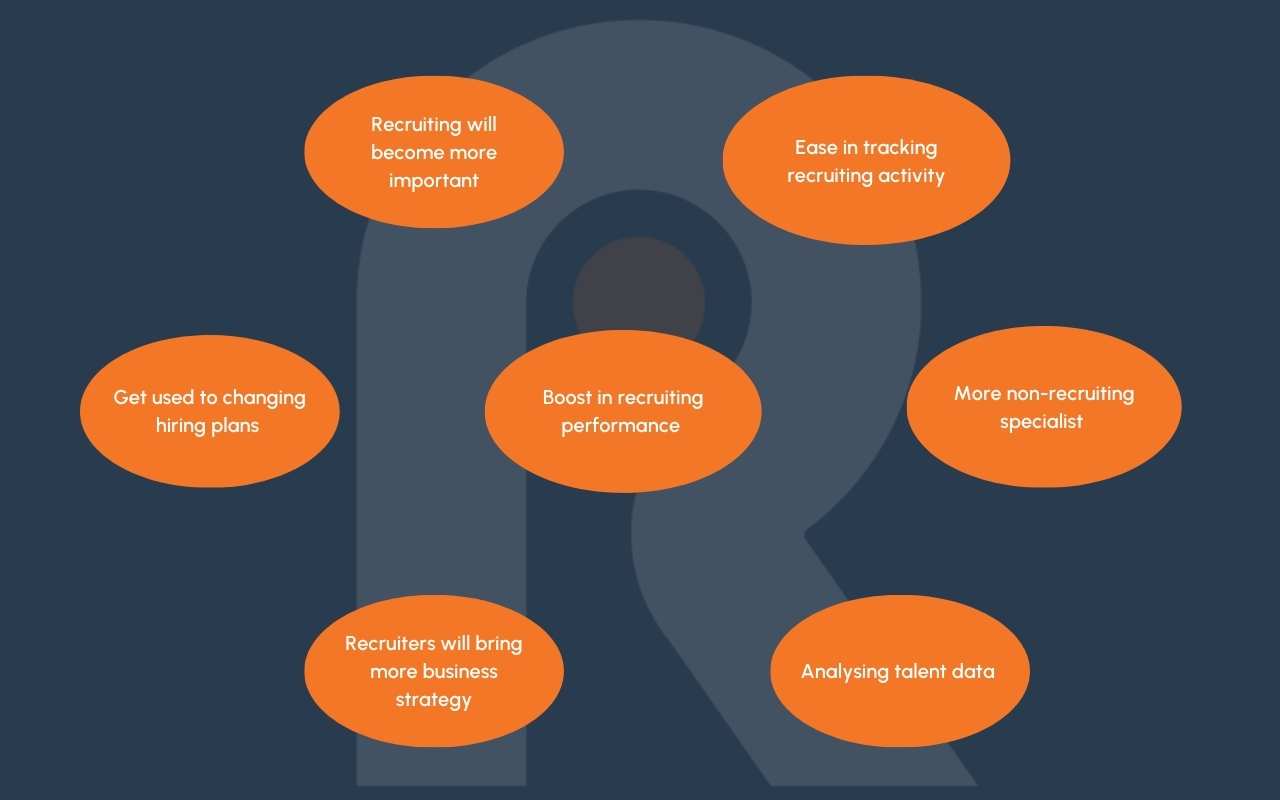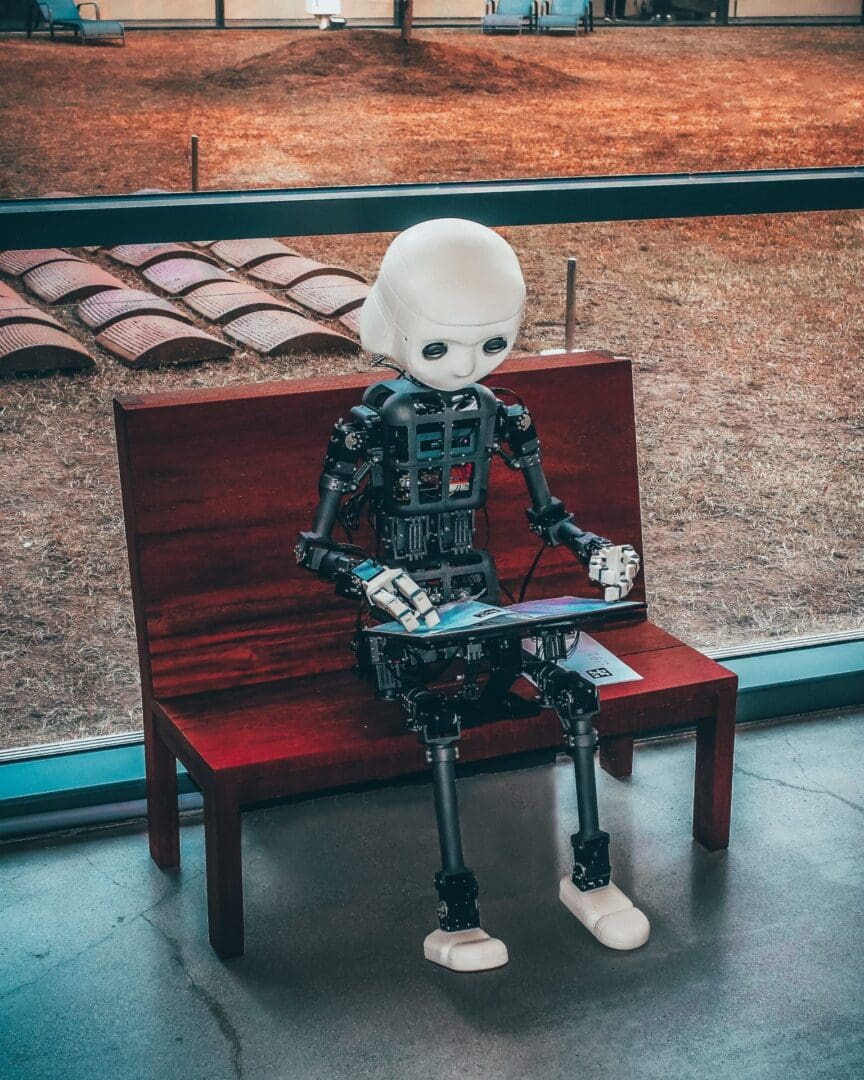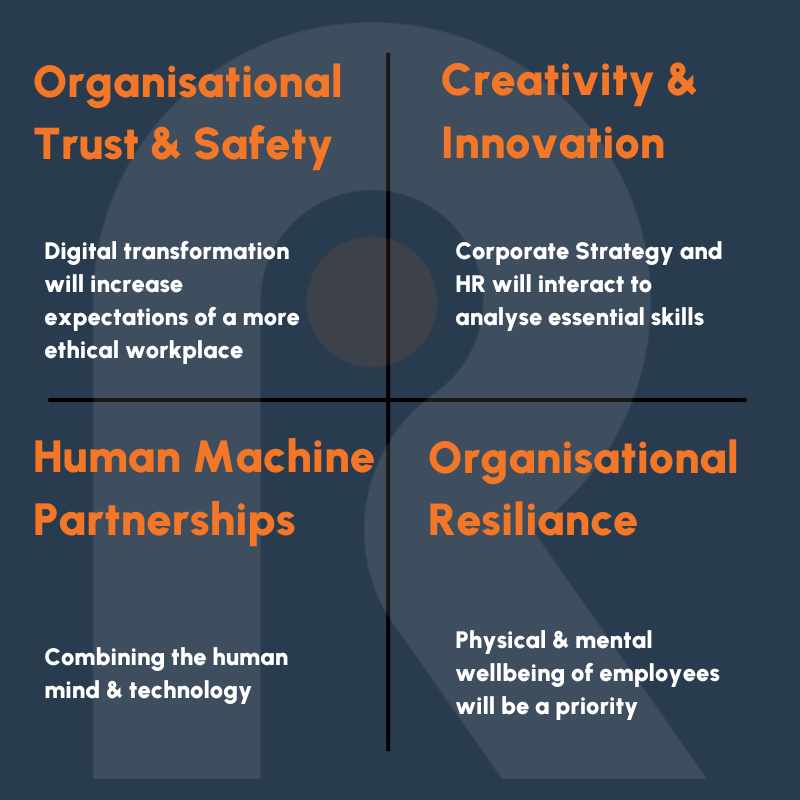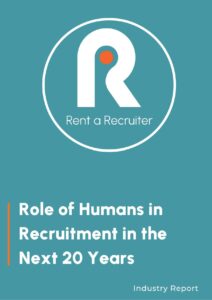Role of Humans in Recruitment in the Next 20 Years
Since recruitment as a process is deeply anchored in interpersonal interaction, it is impossible to conceive it taking place without people. If HR is responsible for enabling it, AI is adapted to enhance it. This mind-machine synthesis is what is going to change the landscape of business over the coming years.
“This is HR’s moment to lead organizations in navigating the future. They have a tremendous opportunity, and responsibility, to provide workers with guidance on the skills and capabilities they will need to be successful over the next decade as new roles continue to emerge”.
According to Harvard Business Review
7 predictions on how recruitment will be different in 2025
1. Recruiting will become even more important than it is now
2. Get used to changing your hiring plans
3. Recruiters will bring more business strategy
4. It’ll be easy to track recruiting activity, but you’ll care more about calculating business impact
5. Better tools and tech will be key to boosting your recruiting team’s performance
6. Engaging passive talent, analyzing talent data, and advising business leaders will be key skills for recruiters
7. Your recruiting team will probably have more non-recruiting specialists

Figure 1: Predictions of Recruitment by 2025 . Source: LinkedIn Report
Figure 1 is an overview of how recruitment will become more important than it is now as every employer wants to hire the best in this competitive world. Since the economy and the market are constantly changing, they heavily influence the goals of the company. Keeping this in mind, organisations need to constantly update their hiring plans. According to another prediction, recruiters will become strategists by aligning business goals with hiring plans. This will allow them to measure business impact by measuring their practices using metrics (for example, Time-to-Hire or TalentHub). AI will undoubtedly allow efficient tracking of the recruitment process further boosting recruitment performance. Another important thing to recognise is that recruiters play more than just one role, for example, that of a data analyst, marketer, or advisor. Therefore, companies are seeking recruiters with different kinds of specialisation. This will lead to a drastic change in the hiring landscape in the coming years.
A shift in HR focus from administrative to strategic
Automation has significantly improved efficiency and empowered humans to manage and engage in more innovative tasks. This can perhaps make recruitment a bit complex since the goal would be to attract the most talented and innovative employees in this competitive environment. AI and machine learning now help recruiters to engage in human elements of recruitment. Recruitment was never about just sorting out CVs. With AI making the process faster, recruiters now have the time to improve the overall quality of hiring by engaging with the candidates and getting to know more about them which helps them make a more informed decision.
The standards of work are changing and so is the job market. Therefore, recruiters need to be up to date with the job requirements of the company and focus on hiring a diverse pool of talent. This will improve the overall acumen of business like problem-solving, strategic, and creative thinking amongst other things. Because of advancements in new technology, the future of recruiting will witness improved tools and procedures. This will lead to a shift in HR’s priorities to identifying gaps in skill shortages, bridging those gaps, retaining talent by encouraging learning and development and also fostering a collaborative work culture.
New job roles within HR/recruitment teams
Recruiters as Talent Advisors
Machine learning will enable recruiters to become data-driven business partners who are not just filling jobs but delivering the value of strategic importance. This is done by actively setting and managing expectations with the workforce. Therefore, recruiters can play a role of an advisor to enable companies to attract talent, build a strong network at work, hone skills which are in demand in their employees and gather information about the market.
Employee development
It is crucial to build networks with people who deliver programmes which are focused on employee development. By merging recruiting and data insights with employee development, the organisation may proactively discover approaches to increase skill development. Employees are searching for a growth trajectory in their professional careers, thus it is critical to provide them with development opportunities that will, in turn, allow them to contribute to the organisation’s success.
Strategic role
If automation simplifies the recruiting process, the next important thing is to assess the needs of the company and the demands of the market. AI will undoubtedly enable HR to play a strategic, rather than a merely administrative role in the organisation. Automation will advance HR skill sets in areas that have a higher impact on employee development and company output, for example analysing emerging trends, tying business priorities with workforce capabilities and aligning resources.
The human element of work
CEOs are drawn to technology’s prospects of high performance in terms of cost and time to increase their company’s output. The research from Korn Ferry Institute shows that two-thirds of the leaders across various companies felt technology adds greater value than people in the near future, including 44% of them stating that humans will become essentially insignificant as a result of the proliferation of automation and AI. However, reiterating Thomas Davenport, professor at Babson College and a fellow of the MIT Sloan Initiative on the Digital Economy, creating the mission, vision and values of a company is still a very human trait. It is true that without humans, automation would be trivial because to achieve a business goal, it is important to find a business purpose which seems to be more of a human quality.
“Executives who see the big picture are able to answer the critical questions that will guide their organisations’ future.”
- Korn Ferry
According to the Deloitte report 2021, HR will need to cater to a number of uncertainties since the nature of the employee-employer relationship is constantly evolving. The diversification of tasks, employee independence, work-life balance and the level of transparency are growing demands in an employment relationship. Based on this, it is plausible to conclude that HR will need to evolve and incorporate new technologies to cater for these demands while making the whole process seemingly efficient.
HR in the next 20 years
A Harvard Business Review article laid out very important roles that HR will need to play in future. Figure 2 highlights the expectations of this new generation of workforce. Employee privacy is a concern now more than ever when a single click on social media platforms can reveal their interests, location, and personal details. Research conducted by Oracle Foundation on the attitudes towards AI revealed how people are concerned about data security breaches, with 80% of respondents preferring permission before using AI to gather their information which makes assessing the AI model extremely crucial.
The second role of HR is to facilitate creativity. Innovation is an ever-evolving concept. Therefore, it is important to constantly analyse what skills are in demand and how to get maximum returns through upskilling employees through training.
While technology improves data analysis, there is no better tool for judgement than the human mind. The future of HR expects an intersection of the human mind and technology to yield better results. It is essential to strike a balance between analysing data and aligning the data to business goals, especially in recruitment where judgement matters just as much as automation in handling routine tasks like screening, interviewing etc.
Finally, ever since the pandemic, employee well-being has become a priority for every organisation. HR needs to provide candidates with an atmosphere that fosters personal growth and development.
The future of recruitment depends on both technological advancements as well as adapting to a constantly changing work environment. While automation is taking over HR processes, humans still add enormous value to understanding the nuances of work, from recruiting to strategy building. The nature of recruitment is gradually shifting its focus to catering for the demands of today’s workforce which include career growth. This necessitates a proactive strategy to ensure employee satisfaction and enhance their potential by building employment relationships and contributing to organisational growth.
This report was completed in conjunction with Trinity College Dublin.
Download PDF >







